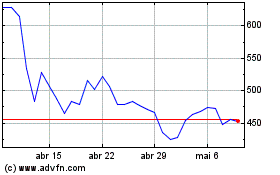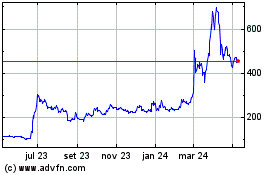Bitcoin Price Crashes Below $61,000: The Main Reasons
24 Junho 2024 - 11:30AM
NEWSBTC
In the last 24 hours, the Bitcoin (BTC) price fell by up to 4.8%,
plummeting to a new low of $60,601 after trading above $64,000 just
a day earlier. This decline can be attributed to a combination of
factors, including developments from the Mt. Gox saga, a
significant liquidation of long positions, and ongoing miner
capitulation. #1 Mt. Gox News Shakes Market Confidence The sudden
and steep decline from $62,900 to $60,601 in Bitcoin’s price
coincided closely with a new announcement from the trustees of the
defunct Bitcoin exchange, Mt. Gox. This exchange, central to one of
the earliest and largest Bitcoin thefts, declared it would start
repaying victims using the stolen assets from a 2014 hack in July
2024. According to Nobuaki Kobayashi, the rehabilitation trustee,
the repayment process will include Bitcoin (BTC) and Bitcoin Cash
(BCH) and start in early July. “The Rehabilitation Trustee has been
preparing to make repayments in Bitcoin and Bitcoin Cash under the
Rehabilitation Plan […] The repayments will be made from the
beginning of July 2024,” the announcement reads. Related Reading:
Bitcoin Crash: Crypto Analyst Reveals Why Price Could Drop To
$52,000 This news was perceived negatively by the market, primarily
due to fears of oversupply from beneficiaries likely selling off
assets that have massively appreciated since their initial
investment period before 2013. In May 2023, the trustee moved over
140,000 BTC, worth approximately $9 billion. This transaction was
significant as it was the first movement of these funds in five
years, tracked closely by analysts and traders. Market reactions
were immediate; Bitcoin prices tumbled as speculations about
potential market flooding with these repaid coins took hold. #2
Record Liquidations Of Long Positions Adding to the downward
pressure, there was a notable surge in the liquidation of long BTC
positions. According to the latest data from Coinglass, a
staggering $85.4 million worth of long positions were liquidated.
This event marks the largest liquidation since April 30 and May 1,
when over $195 million ($95 million and $100 million respectively)
in longs were liquidated, correlating with a 12.5% price drop over
those two days. Such liquidations occur when the market price
reaches the liquidation price of leveraged positions, triggering
automatic sell-offs to cover the losses, further driving the price
down. This cascade effect contributes significantly to rapid price
declines and increased market volatility. #3 Ongoing Miner
Capitulation Adds To Sell Pressure The third critical factor
affecting Bitcoin’s price is the ongoing miner capitulation. Miner
capitulation refers to a situation where miners, particularly those
operating with marginal efficiency, begin selling their mined BTC
to cover operational costs due to unprofitability. This phase can
exert substantial downward pressure on Bitcoin prices as it
increases the supply of Bitcoin being sold in the market. Related
Reading: Bitcoin Drops Below $64,000, But Arthur Hayes Advocates
‘Buy The Dip’ As reported by NewsBTC, renowned crypto analyst Willy
Woo and others have pointed out that miner capitulation is a
crucial phase to monitor, especially following the Bitcoin halving
events that reduce miner rewards by half, thereby straining their
profitability. Woo noted recently that the recovery from such
capitulations has historically been slow and tied closely to the
resurgence in mining activity and hash rates. Crypto expert Jelle,
speaking via X, highlighted the ongoing nature of this capitulation
today, saying, “Hash Ribbons are showing that miner capitulation is
ongoing — exactly what you want to see post-halving. Generally
speaking, the market starts rallying once that capitulation phase
comes to an end.” At press time, BTC traded at $61,241. Featured
image from iStock, chart from TradingView.com
Bitcoin Cash (COIN:BCHUSD)
Gráfico Histórico do Ativo
De Dez 2024 até Jan 2025

Bitcoin Cash (COIN:BCHUSD)
Gráfico Histórico do Ativo
De Jan 2024 até Jan 2025
